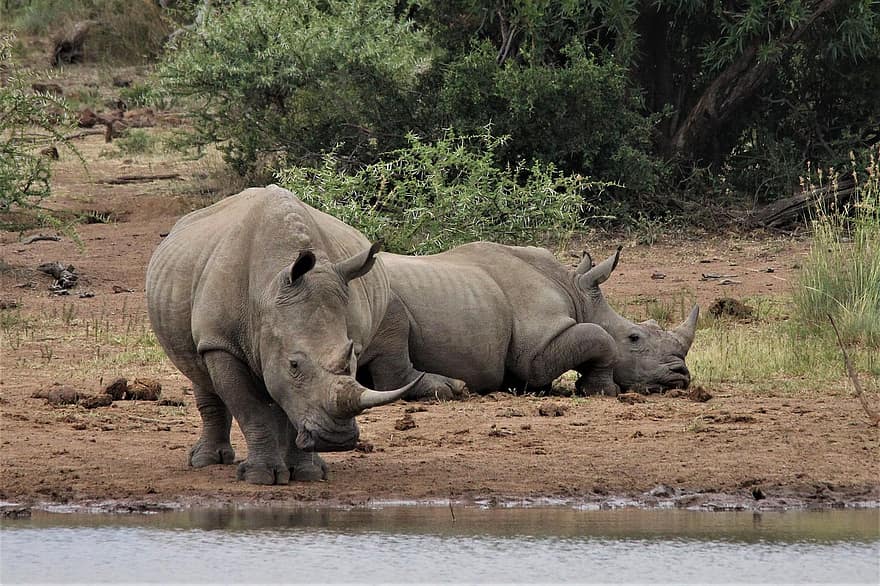
Damian Williams, the United States Attorney for the Southern District of New York, announced that MOAZU KROMAH, a/k/a “Ayoub,” a/k/a “Ayuba,” a/k/a “Kampala Man,” a citizen of Liberia and resident of Uganda, was sentenced on August 19 to 63 months in prison for conspiring to traffic in millions of dollars in rhinoceros horns and elephant ivory, both endangered wildlife species, which involved the illegal poaching of more than approximately 35 rhinoceros and more than 100 elephants. The sentence was imposed by U.S. District Judge Gregory H. Woods. KROMAH was previously extradited to the United States from Uganda on June 13, 2019, to face charges in this case, and he has been detained since his arrival in the United States.
U.S. Attorney Damian Williams said: “The protection of endangered wildlife and natural resources remains a crucial and important priority for my Office. Today’s sentence demonstrates that those who are responsible for the decimation of global populations of endangered and threatened animals protected by international agreements will face serious consequences. This case also exemplifies our commitment, together with the U.S. Fish and Wildlife Service and the Drug Enforcement Administration, to work with our international partners to arrest and bring to justice in a U.S. courtroom those who commit these serious crimes abroad.”
In imposing today’s sentence, Judge Woods remarked that he agreed with the Government that a significant sentence was necessary to send a “loud and clear message” that such large-scale wildlife trafficking warrants serious consequences.
According to the charging and other documents filed in the case, as well as statements made in court proceedings:
KROMAH and two of his co-conspirators, AMARA CHERIF, a/k/a “Bamba Issiaka,” a citizen of Guinea, and MANSUR MOHAMED SURUR, a/k/a “Mansour,” a Kenyan citizen, were members of a transnational criminal enterprise (the “Enterprise”) based in Uganda and surrounding countries that was engaged in the large-scale trafficking and smuggling of rhinoceros horns and elephant ivory, both protected wildlife species. Trade involving endangered or threatened species violates several U.S. laws, as well as international treaties implemented by certain U.S. laws.
From at least in or about December 2012 through at least in or about May 2019, KROMAH, CHERIF, and SURUR conspired to transport, distribute, sell, and smuggle at least approximately 190 kilograms of rhinoceros horns and at least approximately 10 tons of elephant ivory from or involving various countries in East Africa, including Uganda, the Democratic Republic of the Congo, Guinea, Kenya, Mozambique, Senegal, and Tanzania, to buyers located in the United States and countries in Southeast Asia. Such weights of rhinoceros horn and elephant ivory are estimated to have involved the illegal poaching of more than approximately 35 rhinoceros and more than approximately 100 elephants. In total, the estimated average retail value of the rhinoceros horn involved in the conspiracy was at least approximately $3.4 million, and the estimated average retail value of the elephant ivory involved in the conspiracy was at least approximately $4 million.
Typically, the defendants exported and agreed to export the rhinoceros horns and elephant ivory for delivery to foreign buyers, including a buyer represented to be in Manhattan, in packaging that concealed the rhinoceros horns and elephant ivory in, among other things, pieces of art such as African masks and statues. The defendants received and deposited payments from foreign customers that were sent in the form of international wire transfers, some of which were sent through U.S. financial institutions, and paid in cash.
On or about March 16, 2018, law enforcement agents intercepted a package containing a black rhinoceros horn sold by the defendants that was intended for a buyer represented to be in Manhattan. From in or about March 2018 through in or about May 2018, the defendants offered to sell additional rhinoceros horns of varying weights, including horns weighing up to approximately seven kilograms. On or about July 17, 2018, law enforcement agents intercepted a package containing two rhinoceros horns weighing over five kilograms sold by the defendants that were intended for a buyer represented to be in Manhattan.
Prince William, Duke of Cambridge, said “Today’s sentencing demonstrates both what is possible when a coordinated international response is brought to bear against the illegal wildlife trade, and why it is essential. This is a significant victory and a landmark case. For over a decade, its complexity has been skilfully met by a global alliance of international law enforcement agencies, governments, NGOs and private sector organisations, including a number of brilliant United for Wildlife partners.”





